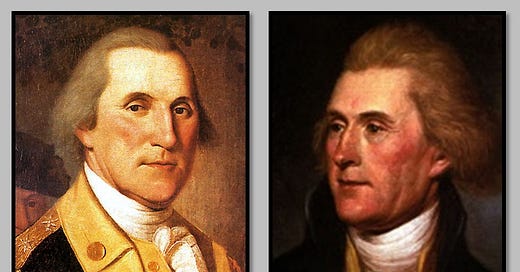TDIH: Virginia Takes a Stand
Virginia was furious! After all, if Parliament could close the port in Boston, then couldn’t it close *any* American port?
On this day in 1774, the Virginia House of Burgesses takes a stand against Great Britain. The colonists were fed up! The British Parliament had been trying to squash colonial resistance in the wake of the Boston Tea Party, but now these Virginians were ready to push back.
George Washington was among these Burgesses, as was Thomas Jefferson. Did you know that the two served together in Virginia’s colonial legislature before the American Revolution?
The issue of “taxation without representation” had long festered in the colonies, of course, but Parliament’s approval of the Tea Act of 1773 simply made things worse. When a load of tea finally arrived in Boston, colonists were ready to reject the shipment outright. They were irate about the taxes that were due. Unfortunately, the governor (a Loyalist) would not allow them to send the tea back. He wanted the tea to come ashore. Taxes were due by December 17.
Perhaps unsurprisingly, then, the night of December 16 turned interesting.
In the middle of the night, a group of Bostonians boarded British merchant ships, dressed as American Indians. (They wanted to express to Parliament that they were *American.*) They threw the tea overboard, but they also deliberately avoided damaging anything else on the ships. Their only goal was to avoid payment of an unjust tax.
Naturally, news of the Boston Tea Party soon reached England, and Parliament quickly retaliated. It approved a measure closing the Port of Boston to all vessels, effective June 1. Boston was supposed to make recompense for the tea that had been lost before its port could be reopened.
If Parliament hoped to punish Boston without affecting the mood in the rest of the colonies, then its members were sorely mistaken. Virginia was furious! After all, if Parliament could close the port in Boston, then couldn’t it close *any* American port?
Interestingly, the first step that Virginia took was to call for a day of fasting and prayer.
“We were under conviction of the necessity of arousing our people,” Jefferson wrote, “from the lethargy into which they had fallen as to passing events; and thought that the appointment of a day of general fasting and prayer would be most likely to call up and alarm their attention.”
In the meantime, Virginia’s Royal Governor was angry. He immediately dissolved the legislature. George Washington was surprised. “[T]his Dissolution was as sudden as unexpected,” he wrote, “for there were other resolves of a much more spirited Nature ready to be offerd to the House . . . .”
The Burgesses weren’t going to be stopped by a little thing like the Royal Governor dissolving their offices, of course. They met again as private citizens, and they signed an agreement declaring that “an attack made on one of their sister colonies, to compel submission to arbitrary taxes, was an attack made on all British America, and threatened ruin to the rights of all, unless the united wisdom of the whole be applied.”
In other words, the colonies were already uniting and preparing to work together. The “shot heard ‘round the world” at Lexington was less than a year away.
Sources can always be found on my website, here.





People try to ignore our Christian roots nowadays, but the first amendment was about keeping the state out of church business. 🙏
Thank you Tara. This post clarified several things that I have wondered about or learned for the first time. I have wondered why the raid on British tea was conducted by Americans dressed as American Indians and now, I know.
I also have learned that the Virginia Burgesses were dissolved and the former Burgesses resolved for a day of prayer and fasting and that as private citizens, they resolved that a punishment on one British Colony was a punishment on all.
George Washington and Thomas Jefferson were in the thick and thin from the very beginning of our quest for freedom and independence. Thank you Tara.